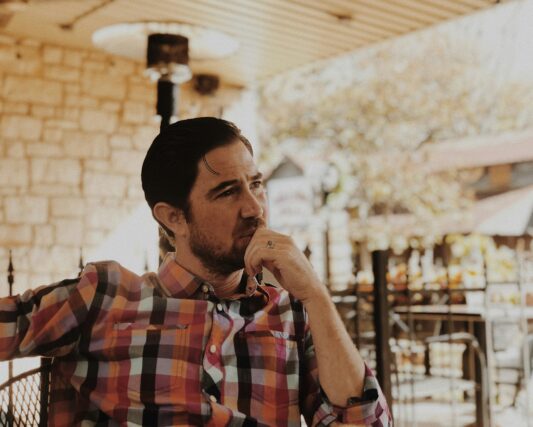Self-awareness is, I would venture to say, the most important quality a person can have.

The ability to assess your own behaviours, reactions, and motivations in life can work wonders for making you a much better person. Sadly, it’s a trait that’s in short supply. Do you have it? If these thoughts cross your mind regularly, congrats — self-awareness is clearly a strong-suit for you.
1. “I wonder why I reacted that way.”

Questioning your own reactions is a clear sign of self-awareness. Instead of just acting on impulse, you take the time to examine your behaviour. A bit of reflection helps you understand your triggers and potentially change your responses in the future. It’s the first step towards personal growth and improved emotional intelligence.
2. “Maybe I’m wrong about this.”

Being open to the possibility that you might be mistaken shows a high level of self-awareness. It proves that you’re not too proud to consider other perspectives and that you understand the limitations of your own knowledge. You’re open to being wrong, and that’s amazing.
3. “I need to work on my patience.”

Recognising your own flaws is a key aspect of self-awareness. By acknowledging areas where you need improvement, you’re taking the first step towards positive change. You’re attuned to your behaviour and the way it impacts other people, and that’s impressive.
4. “I’m feeling anxious, but I’m not sure why.”

Being aware of your emotions, even when you don’t fully understand them, is a sign of emotional intelligence. Your awareness lets you start exploring the root causes of your feelings, rather than simply reacting to them. It’s the foundation for better emotional management.
5. “I might be biased about this.”

Acknowledging your own biases is a sophisticated level of self-awareness. It shows that you understand that your perspectives are shaped by your experiences and that you might not always see things objectively. As a result, it can lead to more fair and balanced thinking.
6. “I’m procrastinating because I’m afraid of failure.”

Understanding the underlying reasons for your behaviour shows deep self-awareness. By recognising that fear is driving your procrastination, you can address the root cause rather than just the symptom. This insight is vital for overcoming self-sabotage.
7. “I need to apologise for how I acted.”

Recognising when you’ve behaved badly and taking responsibility for it is a clear sign of self-awareness. It shows that you’re able to step back and evaluate your actions objectively, and that you understand the impact of your behaviour on the people around you. That takes guts (and self-awareness, obviously).
8. “I’m not in the right headspace for this right now.”

Being aware of your current mental and emotional state, and how it might affect your performance or interactions, is highly self-aware. It proves that you understand your limitations and are able to set boundaries when necessary.
9. “I’m projecting my insecurities onto other people.”

Recognising when you’re projecting your own issues onto other people shows a lot of intelligence. It means that you’re able to distinguish between your internal struggles and external reality, which is important for maintaining healthy relationships.
10. “I need to listen more and talk less.”

Being aware of your communication habits and recognising areas for improvement is a very self-aware practise. It shows that you’re conscious of how you interact with people and are willing to adjust your behaviour to improve your relationships.
11. “My past experiences are influencing how I’m reacting now.”

Understanding how your past shapes your present responses is a pretty advanced form of self-awareness. It shows that you’re able to connect your current behaviours to your personal history, which is important for breaking unhelpful patterns.
12. “I’m feeling defensive. I should figure out why.”

Noticing your emotional reactions in the moment, especially challenging ones like defensiveness, shows high self-awareness. By pausing to examine these feelings, you’re able to respond more thoughtfully rather than reacting impulsively.
13. “I’m avoiding this task because it makes me uncomfortable.”
 Source: Unsplash
Source: Unsplash Recognising avoidance behaviour and understanding its root cause is a sign of self-awareness. It shows that you can look beyond surface-level excuses and identify the true reasons behind your actions. The more understanding you have, the easier it is to change things.
14. “I need to take better care of myself.”
 Source: Unsplash
Source: Unsplash Being aware of your own needs and recognising when you’re neglecting self-care is an important aspect of self-awareness. It proves that you’re attuned to your physical and emotional health, and understand the importance of maintaining it.
15. “I’m repeating a pattern I’ve seen in my family.”
 Source: Unsplash
Source: Unsplash Recognising inherited behaviours or patterns is a deep form of self-awareness. It shows that you’re able to step back and see how your upbringing and family dynamics have shaped your current behaviours, which is the first step in choosing whether to continue or break these patterns.
16. “I’m judging this person unfairly.”
 Source: Unsplash
Source: Unsplash Catching yourself in the act of making unfair judgements is a great example of self-awareness. It shows that you’re able to recognise your own biases and prejudices in real-time, which is important for developing more empathy and understanding.
17. “I need to set clearer boundaries.”
 Source: Unsplash
Source: Unsplash Recognising the need for boundaries indicates that you’re aware of your own limits and the importance of communicating them to other people. Not only does this help you have healthier relationships, but it also prevents burnout, so it’s a win-win.
18. “I’m feeling jealous, and that’s okay.”
 Source: Unsplash
Source: Unsplash Acknowledging tough emotions like envy, without judging yourself for having them, shows emotional maturity and self-awareness. It shows that you’re able to sit with uncomfortable feelings and understand them, rather than denying or suppressing them.
19. “I wonder how my actions are affecting other people.”
 Source: Unsplash
Source: Unsplash Considering the impact of your behaviour on those around you is a key aspect of self-awareness. It shows that you understand you don’t exist in a vacuum and that your actions have consequences. And that, I must say, is the best.




